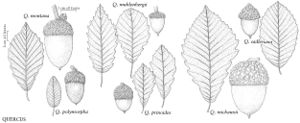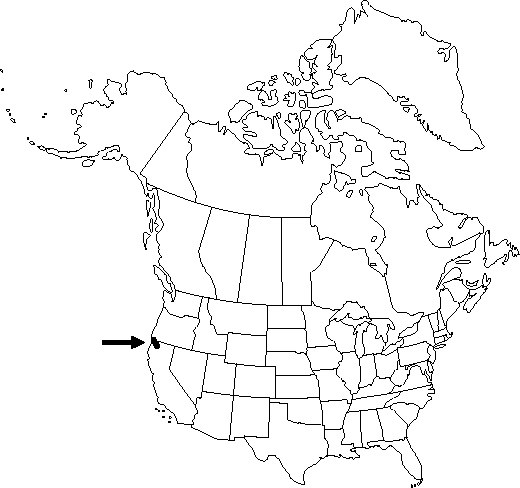Difference between revisions of "Quercus sadleriana"
Ann. Mag. Nat. Hist., ser. 4, 7: 249. 1871.
FNA>Volume Importer |
FNA>Volume Importer |
(No difference)
| |
Revision as of 19:53, 24 September 2019
Shrubs, evergreen, to 1-3 m, rhizomatous. Bark gray, smooth. Twigs reddish or brown, pruinose, 3-4 mm diam., glabrous, sometimes sparsely puberulent around buds. Buds yellowish or tan, broadly ovoid or globose, 8-10 mm; scales loose, acute-ovate, silky. Leaves persisting on branches 2-3 years old; stipules often persistent, to 15 mm, golden-silky; petiole 15-25 mm. Leaf blade obovate or elliptic, 70-140 × 35-80 mm, base rounded or rounded-acuminate, rarely subcordate, margins serrate, not deeply lobed, teeth antrorse-acuminate, sharply mucronate, secondary veins prominent, parallel, straight, (8-)10-15 on each side, apex acuminate or acute; surfaces abaxially light green, waxy, with sparse or scattered, minute, asymmetric, appressed, 4-8-rayed stellate hairs 0.1-0.2 mm diam., and prominent raised stomates giving surface minute granular appearance, adaxially dark green, glabrous. Acorns solitary or paired, subsessile; cup hemispheric or funnel-shaped, 7-9 mm deep × 10-18 mm wide, scales gray, moderately tuberculate, tips reddish brown; nut light brown, ovoid or subglobose, 15-20 × 10-15 mm. Cotyledons distinct.
Phenology: Flowering spring.
Habitat: Open slopes in coniferous forest
Elevation: 600-2200 m
Discussion
Quercus sadleriana is one of the most distinctive western oaks, with strong similarities to certain eastern North American and Asian species of Quercus with "chestnut" leaves. Its restricted distribution in the Siskiyou region and uncertain relationships suggest it is a relictual species. It hybridizes occasionally with Q. garryana var. breweri (see treatment).
Selected References
None.

